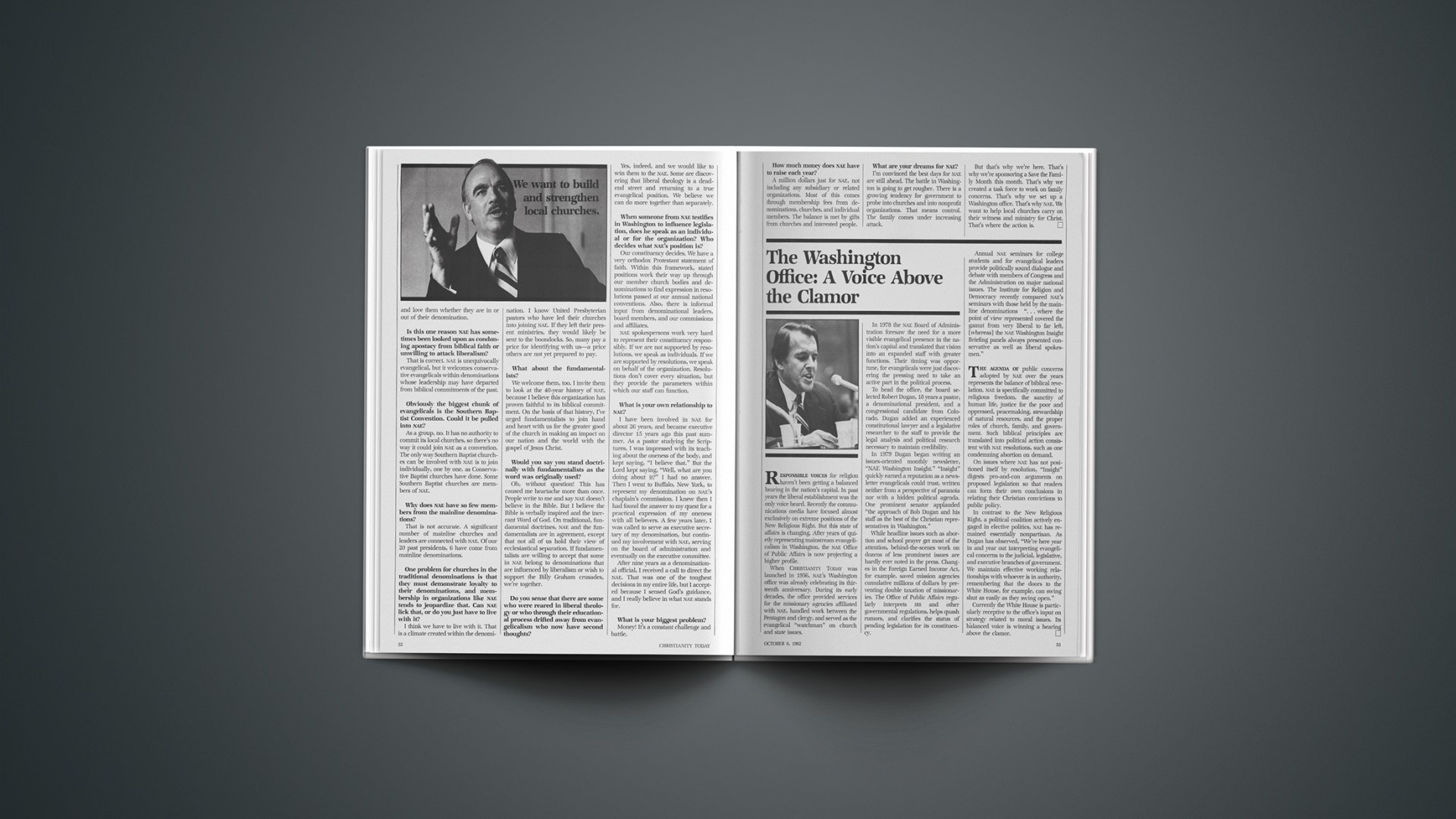Responsible voices for religion haven’t been getting a balanced hearing in the nation’s capital. In past years the liberal establishment was the only voice heard. Recently the communications media have focused almost exclusively on extreme positions of the New Religious Right. But this state of affairs is changing. After years of quietly representing mainstream evangelicalism in Washington, the NAE Office of Public Affairs is now projecting a higher profile.
When CHRISTIANITY TODAY was launched in 1956, NAE’S Washington office was already celebrating its thirteenth anniversary. During its early decades, the office provided services for the missionary agencies affiliated with NAE, handled work between the Pentagon and clergy, and served as the evangelical “watchman” on church and state issues.
In 1978 the NAE Board of Administration foresaw the need for a more visible evangelical presence in the nation’s capital and translated that vision into an expanded staff with greater functions. Their timing was opportune, for evangelicals were just discovering the pressing need to take an active part in the political process.
To head the office, the board selected Robert Dugan, 18 years a pastor, a denominational president, and a congressional candidate from Colorado. Dugan added an experienced constitutional lawyer and a legislative researcher to the staff to provide the legal analysis and political research necessary to maintain credibility.
In 1979 Dugan began writing an issues-oriented monthly newsletter, “NAE Washington Insight.” “Insight” quickly earned a reputation as a newsletter evangelicals could trust, written neither from a perspective of paranoia nor with a hidden political agenda. One prominent senator applauded “the approach of Bob Dugan and his staff as the best of the Christian representatives in Washington.”
While headline issues such as abortion and school prayer get most of the attention, behind-the-scenes work on dozens of less prominent issues are hardly ever noted in the press. Changes in the Foreign Earned Income Act, for example, saved mission agencies cumulative millions of dollars by preventing double taxation of missionaries. The Office of Public Affairs regularly interprets IRS and other governmental regulations, helps quash rumors, and clarifies the status of pending legislation for its constituency.
Annual NAE seminars for college students and for evangelical leaders provide politically sound dialogue and debate with members of Congress and the Administration on major national issues. The Institute for Religion and Democracy recently compared NAE’S seminars with those held by the mainline denominations “… where the point of view represented covered the gamut from very liberal to far left, [whereas] the NAE Washington Insight Briefing panels always presented conservative as well as liberal spokesmen.”
The agenda of public concerns adopted by NAE over the years represents the balance of biblical revelation. NAE is specifically committed to religious freedom, the sanctity of human life, justice for the poor and oppressed, peacemaking, stewardship of natural resources, and the proper roles of church, family, and government. Such biblical principles are translated into political action consistent with NAE resolutions, such as one condemning abortion on demand.
On issues where NAE has not positioned itself by resolution, “Insight” digests pro-and-con arguments on proposed legislation so that readers can form their own conclusions in relating their Christian convictions to public policy.
In contrast to the New Religious Right, a political coalition actively engaged in elective politics, NAE has remained essentially nonpartisan. As Dugan has observed, “We’re here year in and year out interpreting evangelical concerns to the judicial, legislative, and executive branches of government. We maintain effective working relationships with whoever is in authority, remembering that the doors to the White House, for example, can swing shut as easily as they swing open.” Currently the White House is particularly receptive to the office’s input on strategy related to moral issues. Its balanced voice is winning a hearing above the clamor.










